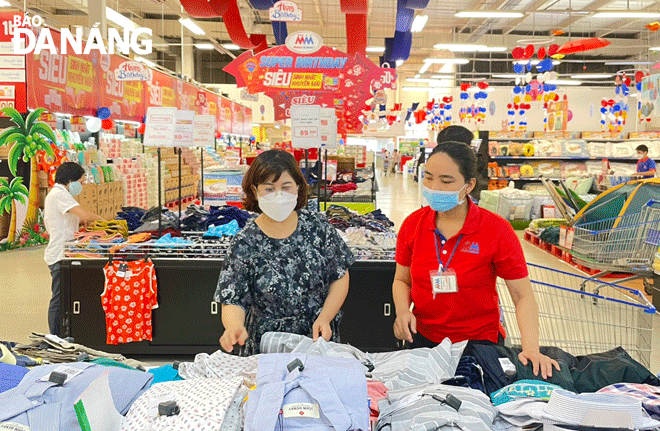Retailers in Da Nang attempt to stabilise commodity market
In the context of escalating gasoline and oil prices, many retailers across Da Nang are looking for solutions to stabilise the commodity market and to stimulate consumer demand.
 |
| Many retailers citywide are trying their efforts to keep prices stable to attract more consumers. IN THE PHOTO: Shoppers at the MM Mega Market supermarket. Photo: Q.TRANG |
Many large supermarkets citywide are making every effort to negotiate with goods suppliers to keep prices stable.
Besides, many retailers have actively launched promotions and reduced prices on some items in a bid to increase purchasing power.
For instance, the MM Mega Market supermarket is offering the promotion programme entitled ‘Big birthday, big promotions’ with discounts up to 50% on many items and ‘buy 2 pay 1’ programme, especially on MM's own brand items, necessities and household appliances.
Also, the supermarket is also about to launch such promotions as ‘buy 1 get 1 free’ and ‘Buy more, get more profits’, multiply 5 times accumulated points on the MCard app.
As reported at the Lotte Mart Danang supermarket, large discounts on many essential items such as cooking oil, fish sauce, seasonings, rice and milk are being offered to customers.
The communication office of the Lotte Mart supermarket said that the supermarket is negotiating to extend the time to apply the new price with suppliers, and at the same time taking advantage of stockpiles to maintain the old price for as long as possible for consumers.
In addition to increasing the stockpiles, the system also accepts to reduce profits to coordinate with suppliers to increase promotions from 10-20% for essential items with highly rising prices.
According to a representative of the WinMart + supermarket system, a recent surge in gasoline prices has led to general fluctuations in the whole market, and the prices of some items on sale at the WinMart + retail system are also affected by pressure from suppliers.
In fact, the most price adjustments have been recorded in cooking oil products, while other items have had negligible fluctuations such as seafood and dry food.
The WinMart + retail system still maintains negotiations with its partners in an effort to control prices, as well as works with local suppliers to purchase products directly at good prices to cut unnecessary intermediary costs.
Moreover, businesses also take the initiative to purchase goods in large quantities to create stable output for manufacturers and suppliers and keep stable prices for customers.
“In particular, we offer many promotions and discounts on hundreds of essential items for customers twice a month with the desire to support consumers to shop with peace of mind during the period of price volatility. We also regularly coordinate with localities nationwide to organize agricultural product weeks with many promotions to promote the consumption of regional specialties” informed the representative of the WinMart + supermarket system.
According to Dr. Vo Quang Tri, Dean of the E-commerce Faculty of the University of Economics - the University of Da Nang, in the coming time, inflation will still be complicated, which can be driven by demand-pull (due to the resumption of services, tourism and consumption after the pandemic), supply-push (due to increased input costs, especially prices of fuel and imported materials) and intrinsic (increasing wages to attract workers and to ensure living standards for citizens).
In addition, policies to regulate trade, import and export are caused the uncertainty of domestic consumer prices, especially the impact of imported inflation in the world into Viet Nam.
Dr. Tri stressed the need for retailers in the city to have flexible shifts to adapt to these pressures. One of the shifts that should be taken into account is to optimise operations and cut costs to offset the increase in input prices.
He also highlighted the importance of diversifying suppliers to find sources of goods that are less affected by freight rates. In addition, retail chains, depending on their sizes and characteristics, can implement volume-stimulating policies to stimulate consumption while increasing goods turnover, and increasing efficiency and profits.
Reporting by QUYNH TRANG - Translating by M.DUNG